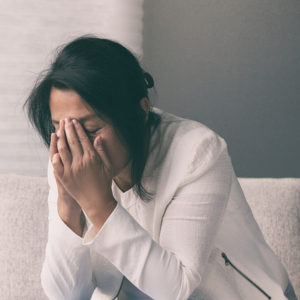The persistent fear since COVID-19 lockdowns began in March was that social isolation and economic hardships would cause a spike in suicides and overdose deaths, but so far the data does not bear that out in the Delaware Valley.
Yet the circumstances remain a mental health crisis for many, and the stress is showing in the social services offered in the region, so much to the point that waiting times for counseling and similar services are becoming a persistent concern for mental health advocates and providers.
In Media, the Family and Community Service of Delaware County (FCSDC) is accustomed to seeing about 180 families a year for counseling needs.
This year, that number went up to almost 230 families seeking therapy.
“COVID has definitely increased the number of people searching for mental health services,” said Heather Grinar, director of counseling administration at FCSDC, “and it has added barriers to being able to see counselors person-to-person.”
Grinar, noting that like so much of life today, mental health counseling is now provided via videoconferencing platforms like Zoom, said the switch is particularly hard for children.
“We have kiddos who are looking at this electronic device and they are supposed to be interacting with their counselor,” she said. “It’s hard to deny that this impacts the way they interact.”
The holidays tend to be a busy time of year for mental health professionals anyway, but in 2020, people are not just dealing with the pandemic itself, but all of the typical human interactions it has either diminished or changed. So, the feeling of social and community support has been diminished too.
“The bottom line is, mental health professionals, like the hospitals, are completely overtaxed right now,” said Ruth Hartman of the Counseling Center, in Holland, Bucks County. “The troubling news here is that many counseling centers are struggling to meet an increased demand.”
If social counselors are working overtime, the early data suggest it is paying off.
As Delaware Valley Journal reported in early November, data from Montgomery and Chester counties showed no spike in suicides, and only the slightest increase in overdose deaths — an increase so small it’s hard to attribute directly to the pandemic.
Additionally, new data from Delaware County provided this week shows suicides in that county through the first 10.5 months of the year are on pace to actually end the year slightly lower than the three previous years, if that rate holds up through the end of 2020.
The new data from Delaware County showed the number of suicides in the county were:
- 2017 – 79
- 2018 – 74
- 2019 – 81
- 2020 – 59 (through first 45 weeks of 2020)
The U.S. Centers for Disease Control and Prevention (CDC) said in June that U.S. adults were reporting “considerably elevated adverse mental health conditions with COVID-19.”
Specifically, the CDC cited younger adults, racial and ethnic minorities, essential workers and unpaid adult caregivers as having “disproportionately mental health outcomes, increased substance use and elevated suicidal ideation.”
FCSDC’s Grinar noted that for those who may have been addicted and were in recovery from substance abuse, many are now “unable to attend those weekly meetings that people would otherwise rely on.”
“The holiday season is always more difficult for mental health,” said Grinar. “And being that we are social creatures, it would be hard to say that there wasn’t an impact on mental health issues with COVID.”
Because the methods to provide counseling services have changed, Grinar said that there is more time invested in getting therapists up and running with a secure network, establishing the protocols for teletherapy, problems with internet access, all of which contribute to a “pretty lengthy wait list,” for therapy.
Masks, social distancing and hand washing will help to prevent the virus spread. But until the immunizations are available everywhere and life begins to really shift back towards the world we knew before March 2020, what can you do to protect your own mental health?
Grinar recommends using the old-fashioned method of calling friends and writing letters. “We all have ‘zoom’ burn out and get tired of looking at screens. We need human interactions and to rely on each other, but in these next few months, we have to change up the way we do it.”

